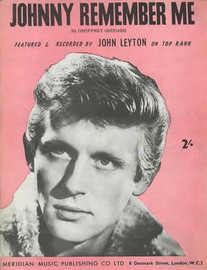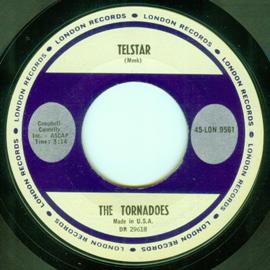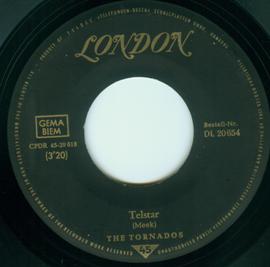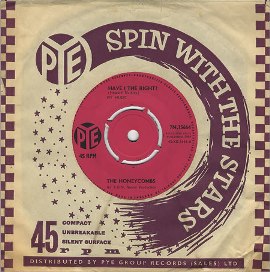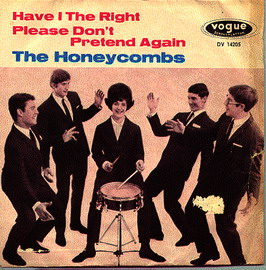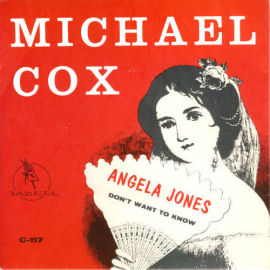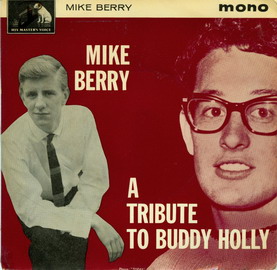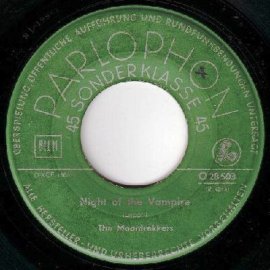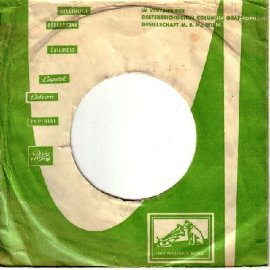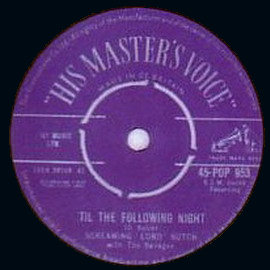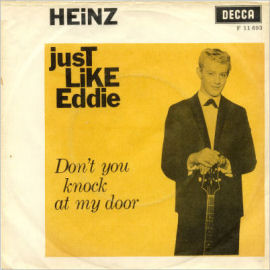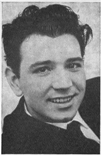|
Joe Meek - a Portrait Part 5: Hits and musicians
All in all, Joe Meek was able to place 25 records in the British Top 40 within his career. The years of 1962 to 1964 were clearly his most productive and successful. In 1963 alone, there were no less than 14 Meek productions in the charts; in the summer he accomplished the feat of having four records at the same time in the Top 30. However, in total Meek had only three #1 hits in Great Britain, namely the following:
John Leyton: Johnny Remember Me (July 1961)
Score and label, GB Atmospherically an intense death song; on his way through the moor the singer hears the voice of his late darling in the sighing of the wind in the tree tops, calling him. Geoff Goddard wrote this song in just 20 minutes, and still today it's thrilling; it belongs to the best potions Meek ever brewed in his wizard's cauldron. And it's a textbook example for Meek's ability to eliminate all the superfluous bells and whistles, there's nothing left in the recording that could be omitted. Leyton is accompanied by the Outlaws; the song was arranged by Charles Blackwell; especially remarkable is the rhythm guitar which is played very precisely (it's not quite clear who played it; according to what he himself said it was session musician Eric Ford). John Leyton himself, but Meek biographer Barry Cleveland as well, maintain there are also strings and wind instruments in the recording. Probably this may be a little flaw of Leyton's memory, obviously he is recalling another tune (understandable after several decades). Even the most painstaking listening with headphones doesn't show the slightest trace of strings or winds. However, this track is one of the few recordings in which Meek didn't speed up the vocals; instead, he slightly slowed them down. And the female refrain singing became a legend: It seems to come from a different, an "otherworldly" acoustic source: With all probability, Meek placed singer Lissa Grey (an academically skilled classical singer) in the tiled bathroom for this effect. The BBC gave to understand that this record wouldn't be played as long as it had the "morbid" lyrics line Goddard wrote originally: "I hear the voice of my darling, the girl I loved who died a year ago." Goddard then changed the lyrics. On the final record "... the girl I loved and lost a year ago" was to be heard. Which made the thing even more mysterious. The BBC blacklisted the record anyways, but Meek managed to place the song in the popular ITV series "Harpers West One". The ban finally - as often in cases like this - turned out to be first-class promotion for the song: Johnny Remember Me climbed up to the #1 spot of the charts, sold 500,000 copies and became "Record of the Year". The follow-up 45 Wild Wind, released short time later in September 1961 was again a - this time highly dramatically arranged - death song, sold 300,000 copies after all (10 weeks in the charts, highest position #2). These two hits temporarily made John Leyton the best-paid singer in the United Kingdom. With Son This Is She (December 1961) his success began to slow down a bit (but the record reached still #15). In the following years Leyton turned up in the charts from time to time, but returned to acting in the first place.
The Tornados: Telstar (August 1962)
GB, U.S. and Germany The Meek composition Telstar is one of the biggest instrumental hits in pop history. The space-crazy Meek had named it after he heard about the start of the first communications satellite; it's a devilish, immortal catchy space tune. The Tornados only provided the basic playback and the guitar solos because the band had another appointment after that: There was an older contract still in power that they had to work as Billy Fury's live band, and neither for love nor money was impresario Larry Parnes willing to release them from this treaty. Meek then completed the semi-finished recording with the help of Geoff Goddard. Goddard laid down the melody voice on the Clavioline (a remarkably precise triple overdubbing in two octaves), and it's his voice coming up in the last part of the tune. At the beginning and the end, Meek added some strange noises he had used already in 1961 for his space fantasy suite I Hear A New World (more info on this see here). The whole recording, as usual, was sped up and got loads of reverb and compression. The Tornados, when they heard the track, considered it to be "crap". The record buyers had a different view: This 45 was in the British charts for six months; on October 3 it pushed Elvis Presley out from the #1 spot and remained there for five weeks. Around Christmas 1962, Telstar also in the U.S. reached the #1 of the Billboard charts. Further #1 placings the record had in Belgium, Ireland and South Africa, in the Netherlands and Norway it reached #3. All in all, Telstar charted in 17 countries all over the world. In Germany the 45 entered the charts in November 1962 and peaked at only #6, but it stayed in the charts for no less than 20 weeks, eight of them in the Top 10 (for info on the "wrong" label of the German 45 see here). In Great Britain alone, Telstar in its original Tornados version sold around 4 million copies within two years on 45s, EPs and LPs; at the time of Meek's death probably around 7 million copies had been sold. And that's not all; the tune also has been covered by a countless number of musicians and bands (a chart can be found here). In the U.S. today probably the cover version by The Ventures is better known than the original. But as a direct listening comparison clearly shows, the original is unbeatable - a pop solitaire that Mojo magazine rightly listed as one of the 100 best 45s of all time. And still today people are puzzled about what's to be heard at the beginning and the end of the track. The follow-up Globetrotter was released in January 1963, and placed in the Top 40 for 11 weeks peaking at #5. Meek, by the way, tried to tie in his big success by recording a vocal version of Telstar (Magic Star with singer Kenny Hollywood), but it was ridiculous and failed completely.
The Honeycombs: Have I The Right (June 1964)
GB and Germany The Honeycombs' band name was a pun on drummer Ann "Honey" Lantree and the fact that she and founding member Martin Murray had been hairdressers, so the comb had been one of their tools. After the band recorded the playback and the vocals, Meek provided a post-processing as it could have occurred only to him: He asked the band members and some other persons to trample the beat on the wooden stairs to the studio and recorded that noise with five microphones he had fixed to the banisters with bicycle clips. In addition, a tambourine was beaten directly onto a microphone. After that, as usually with Meek, the whole recording was sped up and compressed until the cows came home. (Dennis D'Ell, the Honeycombs's singer, hated his sped-up voice, all the more so as this sound couldn't be reproduced on stage.) The composition by Ken Howard and Alan Blaikley was released in June 1964. For the next seven weeks, nothing happened, but then suddenly the record took off. On August 26 it reached the #1 of the British charts, leaving behind Manfred Mann, The Kinks and The Beatles, and remained in the Top 30 for 15 weeks. In August, the record was released also in the U.S. and peaked there at #5 of the Billboard charts. All in all the tune came up in more than 20 charts world-wide and sold around 2 million copies within one year. The Honeycombs also recorded a version in German language (Hab ich das Recht, more info on this to be found here). Still today, Have I The Right can be heard on several oldie samplers. The Honeycombs could not repeat the world-wide success of Have I The Right, but they had further hits in 1964 and the following year (Is It Because, October 1964, peaking at #38; Something Better Beginning, March 1965, #39, written by Kinks songwriter Ray Davies; That's The Way, July 1965, #12), so they were not simply a "one hit wonder" as which they are described sometimes. Especially in Sweden they were a big name. Have I The Right was the beginning of the end of the collaboration between Meek and Geoff Goddard. More background on this highly unfortunate affair to be found here.
Further hits There are a couple of minor hits from Meek's living room studio worth mentioning. Most of them are forgotten today, but some of them are still known at least to oldie fans and record collectors. Many of them can be found still today on record fairs. Here are a couple of records worth listening:
Michael Cox: Angela Jones (May 1960)
GB and SWE Michael Cox from Liverpool already had two releases on Decca Records, both without success. By recommendation of TV producer Jack Good ("Wham!", "Boy Meets Girl") he came to Meek who produced Angela Jones with him. This song, a cover version of the U.S. hit by Johnny Ferguson, reached #7 in the British charts. But then Triumph Records, Meek's record company, ran out of money, so no further copies could be pressed and the 45 was hardly available at the shops. A later Ember pressing was only for export. Michael Cox never had a comparable follow-up hit in Great Britain. But in Sweden the recording had been licenced to Gazell Records and made him a superstar there for several years. And with the tune Sweet Little Sixteen, mentioned already in the "Meek Sound" chapter, he never appeared in the charts but made a true classic of British rock'n'roll.
Mike Berry: Tribute To Buddy Holly (September 1961)
GB Meek's moody obituary on his big hero, written by Geoff Goddard, is sung by Mike Berry, Meek's reincarnation of Holly's voice, including a striking citation from Peggy Sue. The accompaniment is again provided by The Outlaws. Meek, before releasing this 45, had the British Buddy Holly Fan Club give its blessing. And Buddy Holly "himself", at a séance by ouija board, had predicted the success: "Will go to #1", the board decreed. Finally, the record peaked at only #24 of the British charts (and remained six weeks in the Top 40), but well, let's not be pedantic ... The BBC banned this record, but it received good airplay from Radio Luxembourg.
The Moontrekkers: Night Of The Vampire (September 1961)
Austrian release This tune is a wonderful catchy instrumental tune in best surf tradition, spiced up with roaring thunderstorm, a squeaking casket lid and a Joe Meek who screeches piercingly himself. The 45 reached #50 of the British charts and crashed after only one week because a strike in the pressing plant meant no further records could be pressed. But at least the track became an airplay hit on Radio Luxembourg where they played it over and over for several weeks.
Screaming Lord Sutch: Til The Following Night (December 1961)
GB Not a record that ever appeared in the charts, but a slow-burner which sold constantly for several years, so finally it was no flop. And again, a death song (but this time a parodic one) with clanking chains, eerie screams and roaring thunderstorm, foamed up to a sort of mini radio play as probably only Joe Meek could produce it. The original title "My Big Black Coffin" had been changed on urging of the BBC, but the station banned the record anyways. Which probably was best possible promotion. Screaming Lord Sutch had a similar success without entering the charts with Jack The Ripper, released in March 1963.
Heinz: Just Like Eddie (July 1963)
Danish picture sleeve Written again by Geoff Goddard (who also sings back-up here); on guitar we hear Ritchie Blackmore. It's a tribute song for Eddie Cochran who had passed away in 1960; it peaked at #5 of the British charts and stayed in the Top 40 for 15 weeks. Seen in the light of the circa 10,000 Pounds Meek already invested in his "Golden Boy" it's hard to imagine anyways that the Heinz project ever was in the black (more on this later). Country Boy, the follow-up, was released in November 1963, reached #26 and stayed in the charts for nine weeks. * There are several more musicians, bands and titles to be named that had minor hits: Houston Wells, Meek's country voice from Northern England who made it in May 1963 to #22 in the charts with Only The Heartaches; or Don Charles, probably one of Meek's most gifted singers, who in February 1962 reached #39 with Walk With Me My Angel; and The Crying Shames who reached #26 and stayed for seven weeks in the charts with the Burt Bacharach composition Please Stay. A complete list of all the hits of Joe Meek ist to be found here. Not to talk about all the acts who provided first-class pop music but nevertheless failed: Glenda Collins, The Riot Squad, The Millionaires, The Blue Rondos, to name only a couple of them ... Three of the hits mentioned above (Johnny Remember Me, Just Like Eddie und Tribute To Buddy Holly) had been written by Geoff Goddard. As a child in Reading (Berkshire) he sang in the local church choir, later he studied piano and viola at the Royal Academy of Music. Meek, who first wanted to establish him as a kind of "Liberace of Reading" under the name of "Anton Hollywood" soon realized that Goddard's true talent was songwriting.
Geoff Goddard, newspaper photo, circa 1960 As songwriter and pianist he - besides Dave Adams - became Meeks most important collaborator for several years. And not only in this respect Meek and Goddard were like-minded souls: the both of them were dedicated followers of spiritism and occultism. (More info on Geoff Goddard and his compositions to be found here.)
Sources see chapter 13 [Home] [Complete Recordings] [Triumph Story] [CD Discography] [Noten/Scores] [Telstar Cover Versions] [Meek in Germany] [Literature, Documentaries etc.] [Miscellaneous] [Contact] © 2006 Jan Reetze last update: July 27, 2012
|

